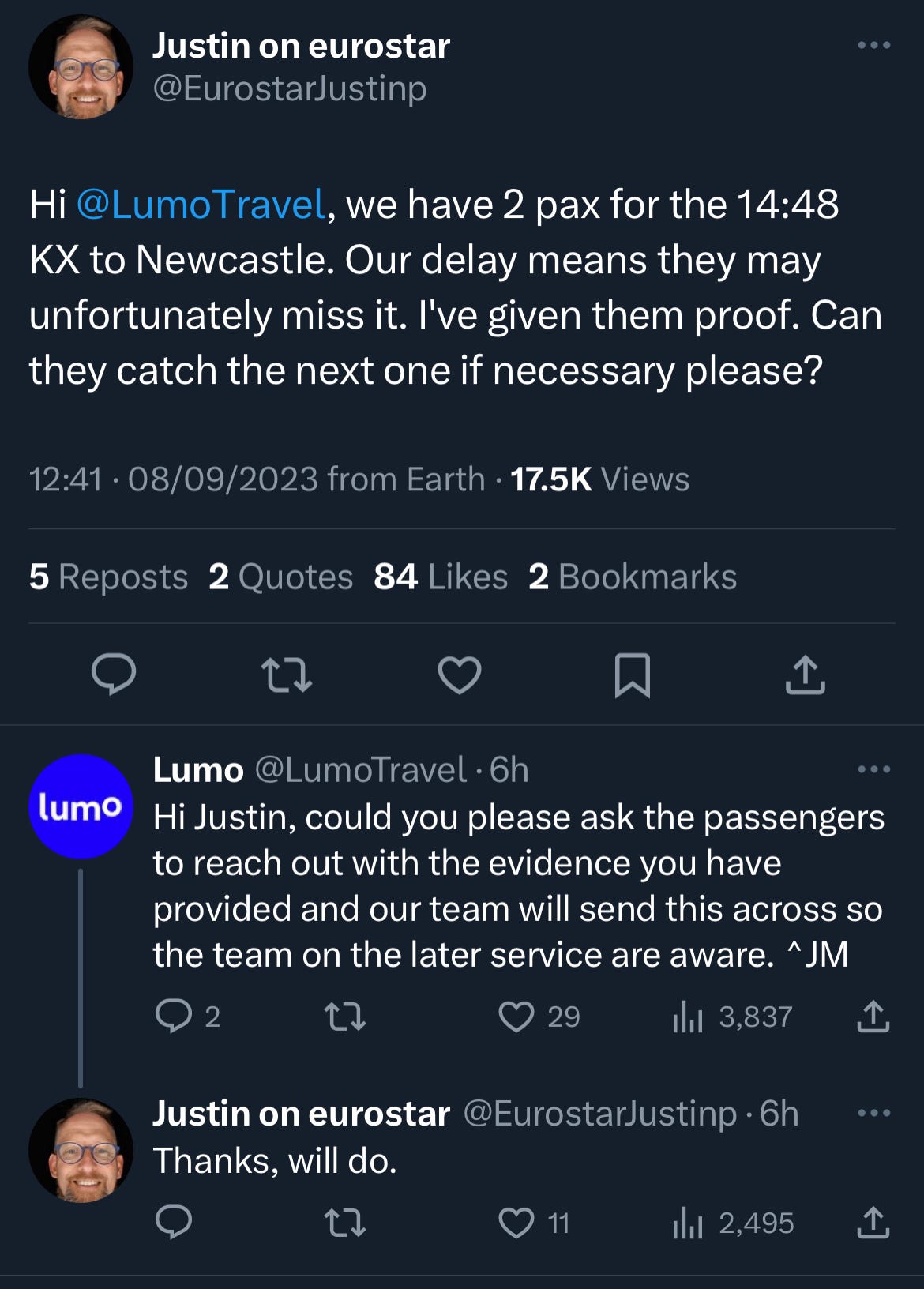Ask people to say two things about me, and - well actually, they’ll probably say ‘Arsenal’ and ‘Essex’, maybe with ‘self-promotion’ coming in a close third.
But once they’ve got past those, ‘customer experience’ and ‘train commuter’ will likely be next on the list.
This week, the areas collided beautifully and took me to a Twitter (nope, still not saying X) thread from a guy called Justin, and a lesson about the importance of transparency.
Justin is, it turns out, a train manager for Eurostar. He uses his platform to give insights into his job, his challenges, and life on trains in general.
He also uses it to help customers, like in the first tweet I saw from him, messaging another train company to help customers who were going to miss their connection:
Whilst that’s impressive, the thing I’m really enjoying about Justin’s tweets is the transparency, the behind-the-curtain look at what’s really going on. The nerdy side of me finds it interesting – but more than that, it gives me more empathy with his job, and the job that train companies and colleagues are trying to do in general.
Take, for example, the next thread I saw, telling the story of what happened when a passenger was taken ill and some difficult decisions that had to be made:
I think we’ve all had that moment where we’re on a delayed train, moaning and criticising, and then we hear the reason – a passenger ill, trespassers on the track, perhaps something even more serious. Instantly, our perspective changes. The lateness doesn’t matter so much anymore, impatience replaced with understanding.
I had a similar incident at an airport recently, as a staff member told us we’d have to check in our luggage because it was too large for the cabin. We, like many others, were furious, and started angrily remonstrating with her. After a while – and looking quite worn down – she said:
‘Look, you’re going to have to take it up with easyJet, I just work at the airport’
‘But this is an easyJet policy – don’t you work for them?’
‘No – they all stay on the plane and let us take all the flack and abuse then act all cheery when you get on board. In the last week I’ve been pushed, spat at, and had a fire extinguisher thrown at me by angry customers. I’m just doing my job’
It’s fair to say we all felt very stupid and were quickly very apologetic. The openness and transparency gave us the reality check that we all badly needed.
For organisations, the default approach is to keep things hidden, afraid to show customers the inner workings of their business for fear of criticism or of being taken advantage of. But this silence simply creates frustration, with default answers of ‘because it’s in the Terms and Conditions’ or ‘That’s our policy’ creating a parent-child feel to the conversation.
Transparency, like that from Justin, builds empathy. You start to understand more about the difficulties and challenges that organisations and their colleagues face. You no longer have that frustration of wondering what’s happening, and now at least have some understanding of the situation, even if it’s still annoying. And you feel like you’re being treated like an adult, able to take on the information and make your own assessment. You feel like you are, in some way, in it together.
But if organisations do their side of the bargain, then we as customers then must do ours. We have to show we can be trusted to know more, to avoid excessive outrage, to act in an adult way – and, most importantly, to treat those colleagues with respect.
If not, there’s going to be a complete breakdown in customer relationships – something which, as the National Rage Survey shows, is dangerously close to happening.
_____
Back to trains, and at my local station, on a strike day. The train was at the platform but not moving. Minutes passed, with the doors remaining steadfastly shut. Frustration grew as the timing board went back and back, with no announcements, no updates.
Eventually, I knocked on the window of the driver’s cabin to ask what was happening. The very friendly, but very nervous driver came out to speak to us. The problem was rather embarrassing, he said. The train had been ‘parked’ on the wrong platform and needed to be switched to the adjacent track. And for this, two members of staff were required. But because it was a strike day, there was only him there. So, he’d have to get an on-call colleague out to help.
‘Why didn’t you just come out and tell us?’, we asked
‘Well, I didn’t want everyone to shout at me’, he replied.





